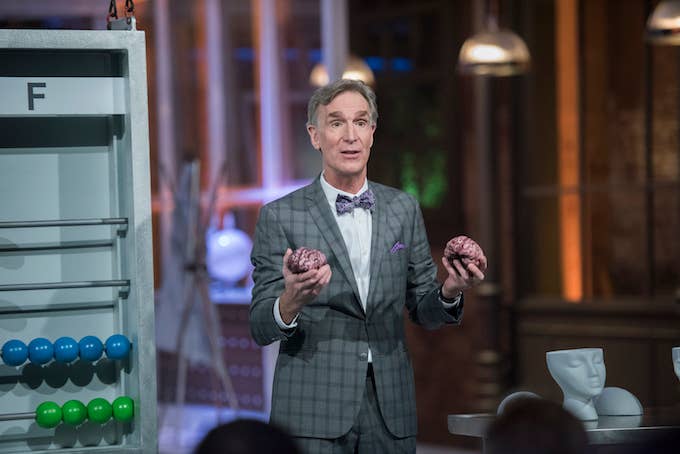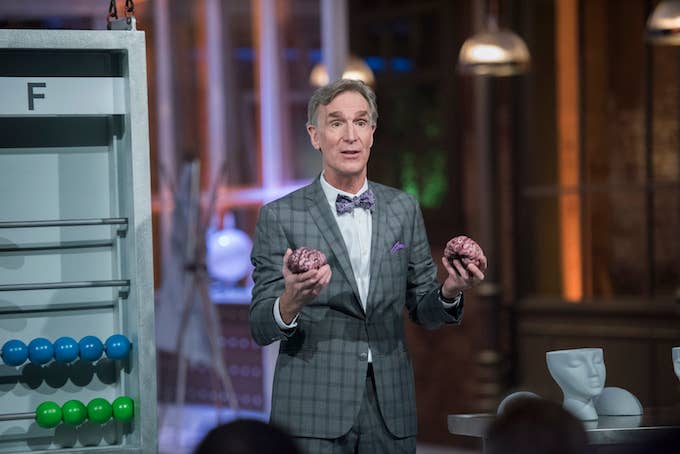
Nostalgia is a dangerous intoxicant. What you once loved may not stand up against the time as you’ve become your jaded, aged self. Or maybe, more simply, you’re just too old for some kid shit. And it’s possible someone might come up and reboot your favorite franchise, butchering it in the process (we won’t name names).
If you’re to know who Bill Nye is, he’s a science OG, the beloved video educator, amongst other titles, that came between Carl Sagan and Neil DeGrasse Tyson in a wonderful time known as the ‘90s. Bill Nye The Science Guy was quirky enough to have us stoked on science and informative enough that our teachers would show it to us on a regular basis. He’s like the Kix of scientists, if you will. That’s why we’re excited about his new show, Bill Nye Saves the World. The generation who grew up on Bill Nye will soon be treated to another series from the eccentric educator, comedian, and mechanical engineer. While the threads to the best show to be wheeled into your classroom are visible, Nye’s latest effort is definitively its own product.
Bill Nye Saves the World, set to premiere in bulk April 21 on Netflix, is a hybrid variety-talk show created for grown ass adults. It’s humorous, but it also contains some serious science in a time when we need it most, debunking alternative medicine, driving home the very serious effects of climate change, and tackling 11 other evergreen topics. And to help get the messages across, he’s enlisted experts and celebrities alike, from Neil DeGrasse Tyson to Karlie Kloss to Desiigner.
We sat down with Bill Nye himself, avoiding a storm inside the safety of a Manhattan hotel. He talked about the show’s format, working with Netflix, and the prognosis for science under a Donald Trump presidency.
It’s been nearly 20 years since Bill Nye, The Science Guy. How does it feel to have another show on this scale?
I did a lot of other shows that were on lesser cable channels, but this show—Netflix has thrown money at the problem. Like, you’re here today for example. It’s very exciting.
How did you arrive at the format? You’ve got a lot of different segments, from experiments to field segments, to your own monologues.
It’s a talk show, first of all, but it’s also a variety show. Instead of just a monologue, I’m a big fan of the cold open, which, to my experience, was pioneered by Saturday Night Live. The show just starts, and instead of me just talking, it’s me doing a science experiment. Then I come out and do a monologue, which is about today’s topic, often with science props. Then there’s the piece of comedy. Then there’s a discussion, which is a real talk show with me and three experts.
But I remind everybody, journalist or network executive alike, a talk show has to be an extension of the host. If you hate Seth Meyers, it doesn’t matter. His show’s gotta be an extension of Seth Meyers. Jimmy Kimmel’s show is an extension of Jimmy Kimmel. That’s just all there is to it. The Saves the World Show is an extension of me. Me! Me! Me! I like comedy pieces, I like cold opens, I like monologues, and I like panels. So there we are.
What about the decision to have celebrity correspondents like Karlie Kloss or a skit with Desiigner? A lot of people will be surprised by that.
Netflix went around the world to get these correspondents. Derek Muller is Australian, nominally. He spends a lot of time in London, I guess. Nazeem Hussain is Australian, but his ancestry’s Sri Lankan. We got these people to do these extraordinary pieces. Derek went to Korea. Karlie Kloss went to Italy. Emily Calandrelli, who’s SpaceGal.com, she went to India. We sent people around the world.
All the late night talk shows are basically in a competition for viral content. Is that something you had in mind as well?
I just tell everyone you can’t go into a thing and say, “Let’s make a viral video.” You just make a show and see if people like it. “Let’s write a hit song!” Yeah we should do that. “Let’s write a platinum record!” Yeah, we should do that. I was gonna go silver, but let’s take it up to platinum. You do your best and see what happens, you know.
The show feels particularly vital now under the Donald Trump administration.
We filmed all 13 shows before the presidential election. Everybody had in the back of his or her mind, “What if the presidential election goes the other way?” The shows are more relevant than they were ever intended to be.
What are you thinking when you see the EPA getting silenced and other changes in his presidency?
I think this is not sustainable for them. There’s a joke we used to tell at Boeing about the B-3 Bomber, which there’s no such thing. It has a pilot and a pitbull. The pilot is there to watch the instruments, and the pitbull is there to make sure he doesn’t touch anything. I wouldn’t be surprised—for example, this completely unqualified woman [Betsy DeVos] who’s now the head of the Department of Education—if the bureaucracy just sort of skates those people off the play for a few things and things just go on hold. I think there’ll be tremendous inertia to violating laws and regulations that have been in place for a long time.
In the case of the EPA, it was established by a Republican administration. It was Nixon. I think these demonstrations that you’re seeing everywhere will have an effect. Demonstrations ended the Vietnam War eventually. On the other hand, the [Keystone] pipeline got approved. Maybe the world will end as a result. That would be an interesting outcome.
That’s troubling, to say the least. Do you have any friends working in government agencies?
Not right now. The friends I had in science don’t work for the current administration. They left with the Obama administration.
Do you talk to them at all about it?
I talk to them continually. We’ve just got to fight the fight. We’ve got to redouble our efforts. The big thing that needs to be addressed for the good of the country, no matter which side you’re on, is gerrymandering. We have to un-gerrymander the districts. Because I think that’s what’s contributed to this polarization. Once you’re elected, you can’t not get reelected. The gerrymandering enables it in a troubling way.
There’s talk of a march for science, and there’s talk of a climate march. But I also wouldn’t be surprised if the bureaucracy renders the deniers impotent, that they have little effect on regulations over the coming years.
What exactly do you want to see?
I want to see legislators respect the facts. Human nature is when you’re confronted with facts that conflict with your worldview, you have to pick. The easiest thing, at first, is to be in denial, whether you’re talking about climate change or having broken something you can’t see. “Did I just break that?” Yeah, you did. There’s a few seconds of “No, no, it’s fine. Put it back together.” We want to get legislators to get their worldviews shifted to respect the facts. Climate change being our classic example. Vaccinations is another important one.
Are you concerned that this show might just be viewed in an echo chamber, that the people who are watching are the people who already believe in climate change or vaccinations?
What are we gonna do? Am I gonna present alternative facts? You gotta play the hand you’re dealt. This show’s gonna be an extension of me. I have concerns about climate change, vaccinations, genetically modified foods, artificial intelligence. So we’re doing shows about those.
Are there any discussions about getting the show to a broader audience of people who may be skeptical?
We want it to be inclusive. On the panels, as best we can, we have people from both sides of the argument. But on climate change, we don’t have a denier on. We do have a guy who makes a living as an astrologer. Whether or not he believes in astrology is unclear. He makes a very good living at it. He does provide a service to his clients who want to believe that there’s something to it.
It sounds pretty cynical.
You could also say it’s cynical for an extraction industry executive who has grandkids, you could say it’s cynical for that person to deny climate change. Or is just one thing lead to another and here we are?


